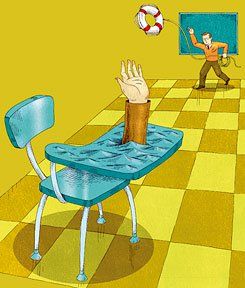Why do students drop out of school?? The experts say that there are many reasons. The good news is that since 1990 the number of dropouts has decreased. Even now there are students that are at risk and still some that drop out because of these risk. So what are the risks that lead to the reasons that children drop out of school.
Some say that they are simply not cut out for school and are behind scared they will never catch up or pass anyway. Others say that they are bored of school after being in school do it day after day for so many years. There are some that are forced to drop out to become caregivers to either their own children, parents or others. In addition there are those that do not see the reason to get a diploma, I believe that this was the reason that my husband's family did not stay in school. Many of them worked the land or did jobs that did not require a diploma of any sorts. Many of the other reasons students quit school were partially related to choices in life and life events:
- Needing to make money to support their families
- Getting held back
- Using drugs
- Becoming pregnant
- Joining gangs
- there were little or no student that dropped out that stated they were kicked out of school. Students from lower income areas are 2.4 times more likely to drop out of school than those n other socioeconomic status. Students that worried about what they would eat, where they would stay, how they would be protected thought more about how to survive and school did not matter a lot
Are you a parent or individual that can help students stay in school?? If so thank you for striving to help them become functional adults. However, there are a few signs you should watch for to ensure they do not dropout.
- Failing grades
- drug use
- sexual promiscuity
- gang activity
- ailing family member who requires assistance
Parents and educators can offer young people more opportunities to learn course materials and get better grades. Offering after school tutoring for those that are in danger of failing, finding a mentor in the community or diagnosing learning disabilities that make academic success more challenging. .
Staying involved in the education of young people by tracking grades, talking to teachers, attending extracurricular events an making plans with their children to do after graduation. Making goals such as college, getting a job or going in military can help students reach the goal of graduation.



:max_bytes(150000):strip_icc()/empty-chair-58acb7f83df78c345ba5844e.jpg)

No comments:
Post a Comment
I love comments so if you have a minute leave me your thoughts on the above post